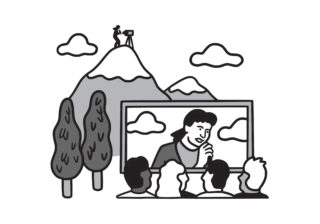A new, connective model of working – Keeley Forsyth on UK culture beyond COVID
The multidisciplinary artist writes about her experience of the past few months, and how it's offered a glimpse of a new way of creating outside traditional cultural hubs

The multidisciplinary artist writes about her experience of the past few months, and how it's offered a glimpse of a new way of creating outside traditional cultural hubs
I’ve been at home in Yorkshire during lockdown. I’ve actually been more productive. My work is predominately performance-based so I have wondered how this will be interpreted with the obstacles now in place. Bodies and objects are all part of the theatrical focus. I am also interested in the idea of taking away frameworks that reflect the past, and moving towards a more fluid internal motivation.
With this in mind, I can visualise a future that on one hand is empty chairs and complications, on the other a shift into representing a more equal structure of working musicians. I like the idea of taking away the spectator, who assumes his place within the rich layers of culture. It’d be good to be out in the elements more, with the boundaries between performer and audience concurrently shifting.
For Marsden Jazz Festival, I filmed my live set out on Saddleworth Moor, working with another sound artist, Jez Riley French, and Matthew Bourne, who I collaborated with on my album (Debris, released January this year). It wasn’t just about my music: Jez was putting microphones in the water and up on the top of the hills, getting all the sound of the place, while I was just coming in and out. That all came out of having to find a different way to approach work, taking ourselves out into the moors instead of a gig setting, and recording it, but in the same way bringing the whole thing in, recording where we are, which suddenly felt more important, rather than just what we were doing.
Venues closing, travel restrictions being in place, and the threat of financial hardship has made the narrative for a working musician more vulnerable. I never considered myself a “musician” or an “actor” as such. It’s more about reminding myself that we are allowed to use everything we have. I do love the idea of breaking these conventions down, so that when you’ve got limited resources, which I have – I’ve got the kids on my own, I don’t play an instrument – you’re still able to make work.
I have always been inspired by the work of the theatre director, Katie Mitchell. Her methods have been in my mind during this period and it has forced me to contemplate blurring the lines between film and live performance and how these may best be served to an audience. Her stuff is based on live performance, but she works across media, filming things as they’re happening, and they’re projected onto a screen, giving you an expanded version of something small that’s happening onstage. There’s something really live about it, but because it’s being recorded, you’re watching the process feed into itself. Even as an audience member you don’t feel that you necessarily have to be there – the process is making the work itself, it’s fulfilled in its own practice, you’re not doing it to an audience.
The human condition is at the centre of the music I make, and I personally always feel the means will reveal themselves in the process, so I don’t worry so much about change and what this may bring. I do worry about the effect it will have on the environments of theatres, galleries and spaces and the social identities that will come out of a time where meeting up in a shared space is deemed appropriate or inappropriate. When these spaces close and the old patterns and visual imprints they come with dissolve, I hope it can bring all artists the same psyche necessary to create a shared reality.
I moved out of London four or five years ago as I couldn’t survive in the way I wanted to, and it was really sad. But weirdly it allowed me to work – all my music was made since I moved out of London. The idea of going back to London and contributing to a system I don’t believe in – high rents and that sort of stuff – I can’t do it.
I do think this crisis will change how culture is distributed geographically in the UK. When you see things breaking down you see how vulnerable the whole thing is, so you can build it anywhere – we are making the work, it’s not necessarily the place. When you are isolated you do remember your own self-sufficiency – you think, “Gosh, the work is actually in me and not these places I thought.” I do think it will be fairer – it would be nice, my god it would be so lovely – but it’s too soon to say.
How may I stay authentic whilst transcending these times? The performative mind has narrowed, although it has illuminated my ideas of political discussion, and mostly I have been moved by musicians coming together to collaborate on each other’s work and process. The impact of a shared environment and mixtures of purpose has generated a dreamlike space for me which I will continue to learn from, and which will hopefully offer me a new, connective model of working.
Keeley Forsyth released her album Debris earlier this year.